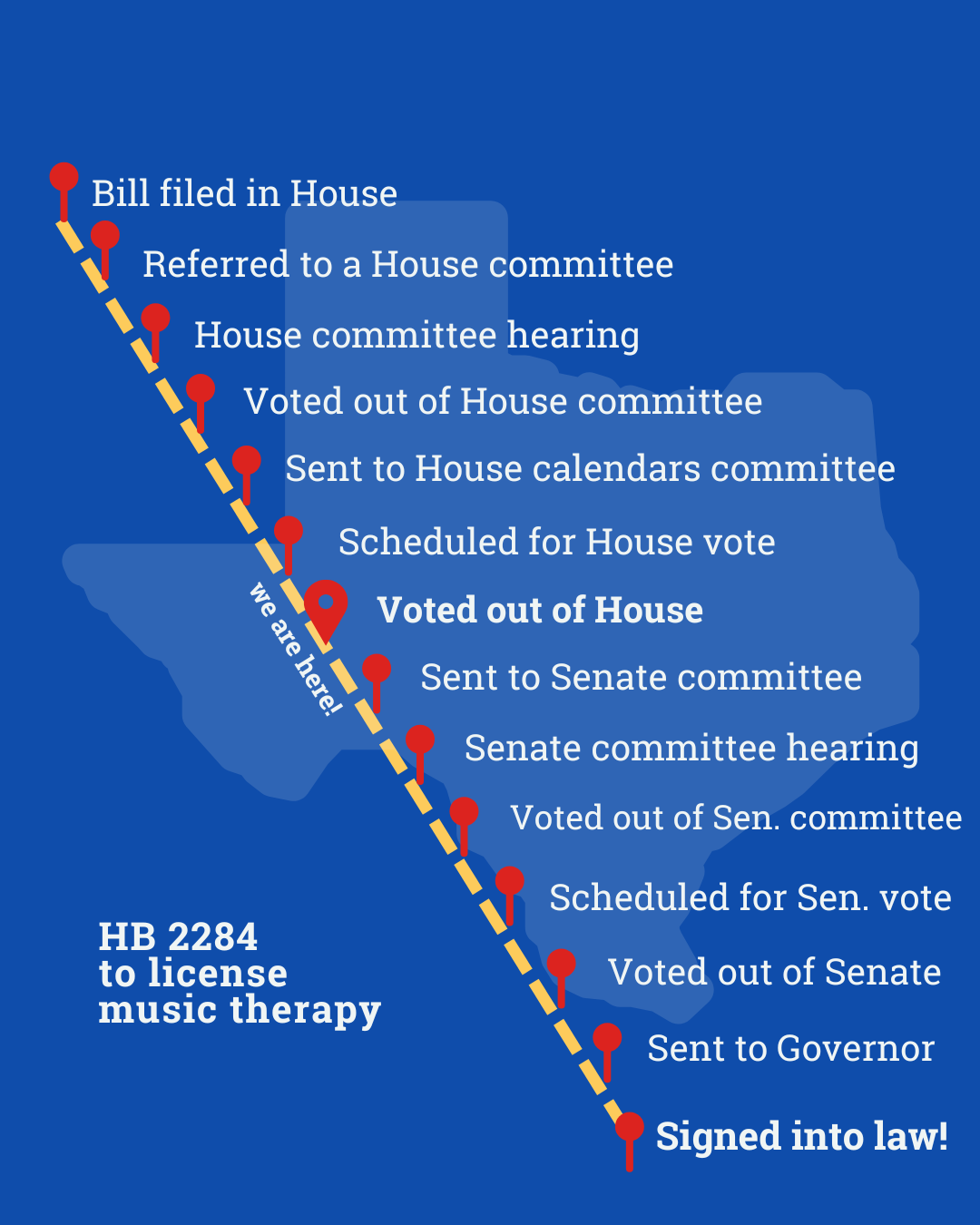Texas State Task Force for Music Therapy Recognition

Welcome to the Force.
The Texas State Task Force for Music Therapy Recognition exists to achieve state recognition of the music therapy profession and the MT-BC credential required for competent practice in order to protect the public and increase access to treatment.
Our volunteer team of music therapists receive support from the Certification Board for Music Therapists (CBMT) and the American Music Therapy Association (AMTA) as part of the nationally collaborative State Recognition Operational Plan.
HB 2284 to License Music Therapy
HB 2284 passed the House on May 9th and has been received by the Senate! We are now waiting to be assigned to a Senate committee and will post more calls to action as we move forward. Watch below as Representative Ann Johnson, our bill author, presents HB 2284 for passage:
Recent Updates
April 2025: HB 2284 Hearing in the House Public Health Committee
On Monday, April 21st, 2025, Liz Laguaite MT-BC and Dr. Shawn Tittle from Houston Methodist delivered powerful testimony to the House Public Health Committee about the need for a music therapy license to protect vulnerable Texans. A huge thank you to Liz and Dr. Tittle along with Jennifer Townsend, Kate Harrison, and Molly Spratt who supported them through six hours of testimony for other bills!
March 2025: Successful Lobby Day; HB 2284 to the House Public Health Committee
A group of 20+ Texas music therapists braved tornado warnings, hurricane-force winds, power outages, 12,000 steps, and 50+ flights of stairs at the Capitol to advocate for HB 2284 to license music therapy. Our bill has been referred to the House Public Health Committee, and the Task Force is preparing testimony as we await a scheduled hearing date. Thank you to everyone who participated in Lobby Day - your advocacy is making a difference!
January 2025: 89th Texas Legislature begins
The 89th Texas Legislature began on January 14th, 2025. The Task Force along with our lobbyist, Molly, are working with legislators in the House and Senate to get our bill to establish a music therapy license in Texas filed. In the meantime, preparations for Boot Camp and Lobby Day are underway - we can't wait to see you in Austin!
September 2024: Hannah-Joy Mach's Senate Testimony
On September 18th, Hannah-Joy Mach provided testimony to the Senate Committee on Health and Human Services about music therapy pertaining to the committee's interim charges of Access to Healthcare and Children's Mental Health. She sat through hours of testimony before being called upon and did an incredible job representing our field.
Hannah-Joy, thank you so much for advocating for music therapy licensure in Texas!
Music Therapy Mention: DFPS Commissioner Stephanie Muth
In the same Senate hearing, Texas DFPS Commissioner Stephanie Muth shared how music therapy had positively impacted the life of one of the children in DFPS care, referred to here by the alias "John."
Frequently Asked Questions
What heals can also harm! Music therapists are trained clinical professionals who hold the MT-BC (Music Therapist - Board Certified) credential. MT-BCs hold degrees from AMTA-approved universities, complete 1200 hours of supervised clinical training, pass a national board exam, and maintain their credential through continuing education. Licensure will protect Texas residents from potential harm by preventing unqualified persons from misrepresenting the field of music therapy. It will also increase access to music therapy services for Texans.
In most states, no. Federal government has moved toward deregulation and allocated more regulatory control to state governments. As a result, other comparable healthcare and education professions are regulated by state governments.
No. We are not seeking to limit the use of music by other professionals through music therapy licensure, only to offer title protection for the term “music therapy.” As we move forward, we will continue to educate legislators on the difference in training, education, and scope of practice between music therapists and other providers and volunteers using music in healthcare and education settings.
AMTA and CBMT suggest that fees be set at $50/year. If the state proposes a fee that is too high, we will not proceed. There would likely be an initial fee, followed by a renewal fee every two years. Our proposal is intended to be cost neutral to the state and affordable for therapists.
When reports of misconduct are reported, they will be investigated by the Texas Department of Licensing and Regulation. After investigation and a subsequent hearing, the commission or executive director may deny, revoke, or suspend a license or may otherwise discipline a license holder.

